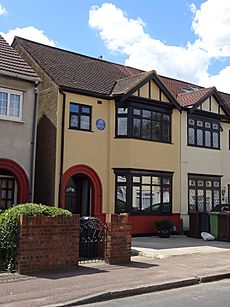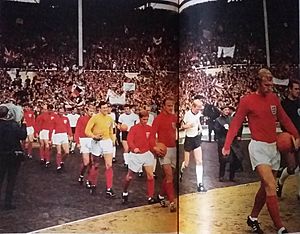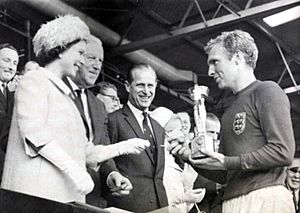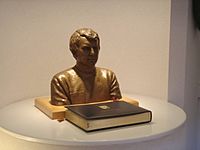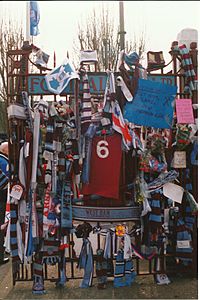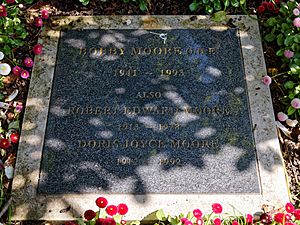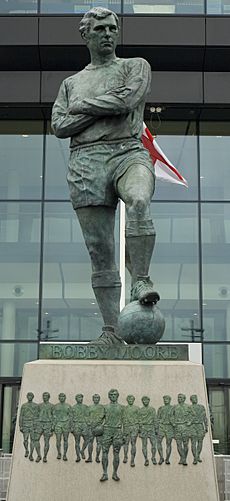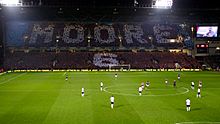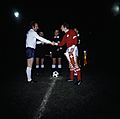Bobby Moore facts for kids
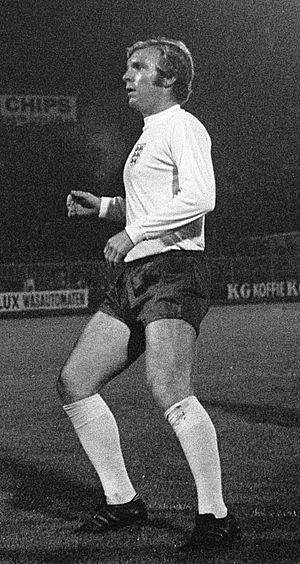
Moore in 1969
|
||||||||||||||||||||||
| Personal information | ||||||||||||||||||||||
|---|---|---|---|---|---|---|---|---|---|---|---|---|---|---|---|---|---|---|---|---|---|---|
| Full name | Robert Frederick Chelsea Moore | |||||||||||||||||||||
| Date of birth | 12 April 1941 | |||||||||||||||||||||
| Place of birth | Barking, Essex, England | |||||||||||||||||||||
| Date of death | 24 February 1993 (aged 51) | |||||||||||||||||||||
| Place of death | Putney, London, England | |||||||||||||||||||||
| Height | 5 ft 10 in (1.78 m) | |||||||||||||||||||||
| Position(s) | Defender | |||||||||||||||||||||
| Youth career | ||||||||||||||||||||||
| Barking | ||||||||||||||||||||||
| 1956–1958 | West Ham United | |||||||||||||||||||||
| Senior career* | ||||||||||||||||||||||
| Years | Team | Apps | (Gls) | |||||||||||||||||||
| 1958–1974 | West Ham United | 544 | (24) | |||||||||||||||||||
| 1974–1977 | Fulham | 124 | (1) | |||||||||||||||||||
| 1976 | → San Antonio Thunder (loan) | 24 | (1) | |||||||||||||||||||
| 1978 | Seattle Sounders | 7 | (0) | |||||||||||||||||||
| 1978 | Herning Fremad | 9 | (0) | |||||||||||||||||||
| 1983 | Carolina Lightnin' | 8 | (0) | |||||||||||||||||||
| Total | 716 | (26) | ||||||||||||||||||||
| International career | ||||||||||||||||||||||
| 1960–1962 | England U23 | 9 | (2) | |||||||||||||||||||
| 1962–1973 | England | 108 | (2) | |||||||||||||||||||
| Managerial career | ||||||||||||||||||||||
| 1980 | Oxford City | |||||||||||||||||||||
| 1981–1982 | Eastern AA | |||||||||||||||||||||
| 1984–1986 | Southend United | |||||||||||||||||||||
|
Medal record
|
||||||||||||||||||||||
| *Club domestic league appearances and goals | ||||||||||||||||||||||
Bobby Moore was a legendary English footballer, famous for being a brilliant defender. He is best known for leading the England team to victory in the 1966 FIFA World Cup. Many people, including famous footballer Pelé, consider him one of the greatest defenders of all time.
Bobby Moore played over 600 games for West Ham United during his 16 years there. He was the team's captain for more than ten years. With West Ham, he won the FA Cup in 1964 and the UEFA Cup Winners' Cup in 1965. His number 6 shirt was officially retired by West Ham in 2008, honoring his amazing career.
He became England's captain in 1964 when he was only 23 years old. He played 108 games for his country, which was a national record for a long time. A bronze statue of Bobby Moore stands proudly at the entrance to Wembley Stadium, showing how important he was to English football. Moore was known for his calm style of play and his ability to read the game, which meant he could predict what opponents would do. In 1966, he was the first footballer to win the BBC Sports Personality of the Year award. He also received an OBE for his achievements.
Contents
Bobby Moore's Football Journey
Starting Out in Football
Bobby Moore was born in Barking, Essex, on April 12, 1941. He loved football from a young age and played for his schools. In 1956, he joined West Ham United as a young player. He worked his way up through their youth teams.
His first game for West Ham was on September 8, 1958, against Manchester United. He took over the number six shirt from his coach, Malcolm Allison. Bobby also played for the England youth team. He helped them reach the final of the UEFA Youth Tournament in 1958.
Bobby quickly became a regular player for West Ham. He was a calm and smart defender. He was famous for understanding the game and knowing where to be. This was different from other defenders who just tackled hard. He was sent off only once in his West Ham career.
Becoming an England Star and European Champion
In 1960, Bobby Moore was called up to the England Under-23 team. His great play for West Ham led to him joining the main England squad in 1962. This was just before the World Cup in Chile. Even though he hadn't played for England yet, he made his first appearance on May 20, 1962, against Peru. He played so well that he stayed in the team for the whole World Cup.
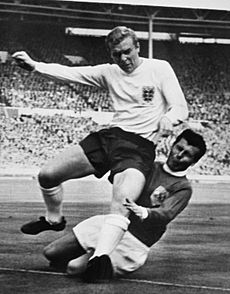
On May 29, 1963, at just 22 years old, Bobby Moore captained England for the first time. He was the youngest person ever to do so! England won that game against Czechoslovakia. Later, new coach Alf Ramsey made Moore the permanent captain in 1964.
1964 was a big year for Bobby. Besides becoming England captain, he also led West Ham to win the FA Cup. They beat Preston North End 3-2 in the final at Wembley. He was also named the Football Writers' Association Footballer of the Year.
In 1965, Bobby lifted another trophy at Wembley. West Ham won the European Cup Winners Cup by beating 1860 Munich 2-0. By this time, he was England's main captain, and coach Alf Ramsey was building a team around him to win the 1966 World Cup.
In 1966, Bobby scored his first goal for England in a 1-1 draw against Poland. He also captained West Ham in the League Cup final, which they lost. But bigger things were coming for Bobby and his West Ham teammates, Geoff Hurst and Martin Peters.
The 1966 World Cup Victory
Before the 1966 World Cup, there was a small issue with Bobby Moore's contract at West Ham. But it was quickly sorted out so he could lead the England team. England played all their games at Wembley. They easily got through their group, then beat Argentina and Portugal to reach the final. West Germany was their opponent.
In the final, West Germany scored first. But Bobby Moore's quick thinking helped England get back into the game. After being fouled, he quickly took a free kick, passing the ball to Geoff Hurst, who scored. This was a move they practiced at West Ham.
Later, Martin Peters scored, putting England 2-1 up. But West Germany equalized in the last minute, sending the game into extra time. Coach Alf Ramsey believed the German team was tired. After Geoff Hurst scored a debated goal, England looked set to win. In the final seconds, with Germany attacking, the ball came to Bobby Moore. Instead of just kicking it away, he calmly passed it to Hurst, who scored his third goal, making it 4-2.
One of the most famous moments from that day is Bobby Moore wiping his hands on the velvet tablecloth before shaking hands with Queen Elizabeth II as she gave him the Jules Rimet trophy (the World Cup). He was the calmest person in the stadium.
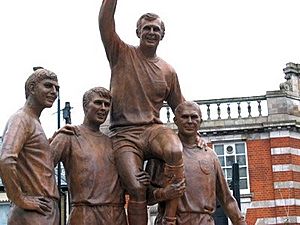
Bobby Moore: A National Hero
After England's World Cup win, Bobby Moore became a national hero. He and the other two West Ham players took the World Cup trophy to different football grounds. At the end of 1966, he won the BBC Sports Personality of the Year award. He was the first footballer to receive this honor. He also received an OBE.
Bobby continued to play for West Ham and England. He earned his 50th cap (international game) in a win against Wales in 1966. England reached the semi-finals of the 1968 European Championships. Moore remained England's captain, and coach Ramsey continued to rely on him.
The 1970 World Cup
The year 1970 was a challenging but important one for Bobby Moore. Before the 1970 World Cup in Mexico, there was a misunderstanding in Colombia where England was playing a warm-up game. Bobby was wrongly accused of something, but the case was dropped, and he was cleared. He then rejoined his teammates for the World Cup.
In the World Cup, Bobby played a key role. In a game against Brazil, he made an incredible tackle on Jairzinho. This tackle is still shown today as an example of perfect defending. Brazil won that game, but England still moved forward. After the match, Bobby famously swapped shirts with Pelé. England reached the quarter-finals, where they lost to West Germany in extra time. At the end of 1970, Bobby Moore was voted runner-up for the European Footballer of the Year award.
Later Years in Football
In 1973, Bobby Moore broke West Ham's record for most appearances. He also earned his 100th cap for England in a big win against Scotland. However, his form started to dip. In a crucial qualifier for the 1974 World Cup against Poland, England needed to win but only drew 1-1. This meant England did not qualify for the World Cup.
Bobby Moore played his 108th and final game for England on November 14, 1973, against Italy. He became England's most-capped player at the time, and he equaled the record for most games as captain.
After West Ham and England
Bobby Moore played his last game for West Ham in January 1974. He then joined Fulham, a team in the Second Division. In 1975, Fulham reached the FA Cup Final, where they played West Ham. Fulham lost 2-0, and this was Bobby Moore's last appearance at Wembley as a professional player.
He played his final professional game in England for Fulham in 1977. He also played for two teams in the North American Soccer League in the United States: San Antonio Thunder and Seattle Sounders. In 1978, he played a few games for a Danish team, Herning Fremad, before retiring from playing.
Life After Playing Football
After retiring as a player in 1978, Bobby Moore tried his hand at football management. He managed teams like Eastern AA in Hong Kong, Oxford City, and Southend United. He became manager of Southend United in 1984 and helped improve the team. He later joined the club's board of directors. In 1990, he became a football analyst and commentator for a radio station.
Many people felt that the Football Association should have given Bobby Moore a bigger role, especially since he was the only Englishman to captain a World Cup-winning team.
Illness and Passing
Bobby Moore had a health scare in 1964 when he was treated for cancer. In April 1991, he had an operation for suspected bowel cancer. On February 14, 1993, he announced that he was suffering from advanced bowel and liver cancer. Just three days later, he commentated on an England match at Wembley. This was his last public appearance.
Seven days later, on February 24, 1993, Bobby Moore passed away at the age of 51. He was the first member of the 1966 World Cup-winning team to die. His funeral was held on March 2, 1993.
The first West Ham home game after his death was on March 6, 1993. The stadium was filled with flowers and tributes from fans. His teammates, Geoff Hurst and Martin Peters, placed a floral West Ham shirt with his number 6 on the field. West Ham did not use the number 6 shirt for that game as a mark of respect.
A public service was held for Bobby Moore at Westminster Abbey on June 28, 1993. All the other members of the 1966 World Cup team attended. He was only the second sportsman to be honored in this way.
Bobby Moore's Legacy
The Bobby Moore Fund is a charity started in 1993 by his wife, Stephanie Moore, and Cancer Research UK. It raises money for research into bowel cancer and helps people learn more about the disease.
In 1996, comedians Frank Skinner and David Baddiel included the line "But I still see that tackle by Moore" in their famous song "Three Lions". This song became the official England team song for the 1996 European Championships. It refers to Bobby's amazing tackle against Jairzinho in 1970.
Bobby Moore was one of the first people to be inducted into the English Football Hall of Fame in 2002. He was also named in the BBC's list of the 100 Greatest Britons. In 2003, UEFA (European football's governing body) chose him as England's "Golden Player" for the past 50 years.
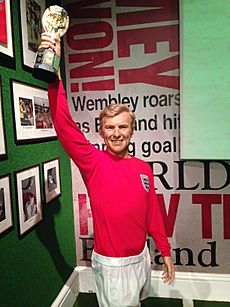
On April 28, 2003, a statue called The Champions was unveiled near West Ham's old stadium. It shows Bobby Moore holding the World Cup trophy on the shoulders of Geoff Hurst, Ray Wilson, and Martin Peters. The south stand at West Ham's old ground was named the Bobby Moore Stand. When West Ham moved to the London Stadium in 2016, a stand there was also named after him.
On May 11, 2007, a large statue of Bobby Moore was unveiled outside the new Wembley Stadium. It shows him looking down Wembley Way. In August 2008, West Ham United officially retired the number 6 shirt in his honor.
In 2016, Bobby Moore became the first footballer to receive an English Heritage Blue Plaque outside his childhood home in Barking. In 2017, the airline Norwegian put his image on the tail fin of one of their planes, honoring him as a "British tail fin hero." The Bobby Moore Academy, a school in London, was also founded in 2017.
Famous Quotes About Bobby Moore
- "My captain, my leader, my right-hand man. He was the spirit and the heartbeat of the team. A cool, calculating footballer I could trust with my life. He was the supreme professional, the best I ever worked with. Without him England would never have won the World Cup." — Alf Ramsey (England Manager)
- "He was my friend as well as the greatest defender I ever played against. The world has lost one of its greatest football players and an honourable gentleman." — Pelé (Brazilian Football Legend)
- "Bobby Moore was a real gentleman and a true friend." — Franz Beckenbauer (German Football Legend)
- "Moore was the best defender I have ever seen." — Sir Alex Ferguson (Famous Football Manager)
- "There should be a law against him. He knows what's happening 20 minutes before everyone else." — Jock Stein (Scottish Football Manager)
- "Immaculate footballer. Imperial defender. Immortal hero of 1966. First Englishman to raise the World Cup aloft. Favourite son of London's East End. Finest legend of West Ham United. National Treasure. Master of Wembley. Lord of the game. Captain extraordinary. Gentleman of all time." — Inscription on the statue at Wembley Stadium.
Honours and Awards
Player Achievements
West Ham United
- FA Cup: 1963–64
- FA Charity Shield: 1964
- European Cup Winners' Cup: 1964–65
England
- FIFA World Cup: 1966
- UEFA Euro third place: 1968
- British Home Championship: Winners in 1964–65, 1965–66, 1967–68, 1968–69, 1970–71, 1972–73. Shared in 1963–64, 1969–70, 1971–72.
Individual Awards
- Ballon d'Or runner-up: 1970
- FWA Footballer of the Year: 1964
- West Ham Player of the Year: 1961, 1963, 1968, 1970
- FIFA World Cup All-Star Team: 1966
- BBC Sports Personality of the Year: 1966
- Officer of the Order of the British Empire: 1967
- UEFA Euro Team of the Tournament: 1968
- Inducted into the English Football Hall of Fame: 2002
- UEFA Jubilee Awards – Greatest English Footballer of the last 50 Years: 2003
- FIFA World Cup All-Time Team: 1994
- FIFA Order of Merit: 1996
- World Team of the 20th Century: 1998
- Number 6 retired by West Ham: 2008
- PFA Player of the Century: 2007
- PFA Team of the Century (1907 to 2007): Team of the Century 1907–1976 and Overall Team of the Century
- World Soccer Greatest XI of All Time: 2013
- 100 Greatest Britons: 2002
- Football League 100 Legends
Bobby Moore in Film and TV
Bobby Moore appeared in the 1981 film Escape to Victory, playing a character named Terry Brady. He also had small roles as himself in the TV series Till Death Do Us Part and its film The Alf Garnett Saga.
A TV drama series called Tina and Bobby was made about his relationship with his first wife, Tina. It was shown on ITV in 2017.
Personal Life
Bobby Moore met his first wife, Tina, in 1957. They got married in 1962 and had two children, Roberta and Dean. They later separated in 1984 and divorced in 1986. Bobby then married Stephanie Parlane in 1991.
Sadly, his son Dean passed away in 2011 at the age of 43 due to a medical condition.
Images for kids
See also
 In Spanish: Bobby Moore para niños
In Spanish: Bobby Moore para niños
- List of footballers with 100 or more caps
 | Audre Lorde |
 | John Berry Meachum |
 | Ferdinand Lee Barnett |


